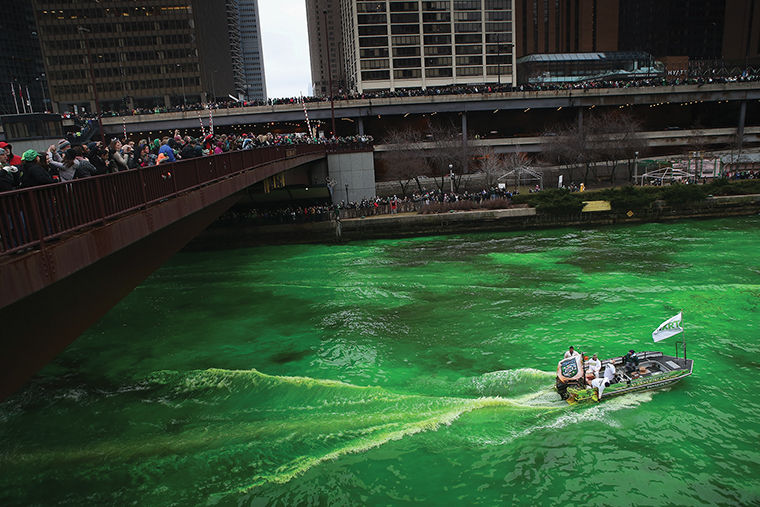St. Patrick’s Day rooted in immigrant tradition
Photo Courtesy of Scott Olson/Getty Images
Workers dye the Chicago River green to kick off the city’s St. Patrick’s day celebration on March 16, 2013 in Chicago, Illinois. The dying of the river has been a tradition in the city for 43 years. (Photo by Scott Olson/Getty Images)
March 16, 2015
Chicago is known for its extravagant St. Patrick’s Day celebrations—the parades, bar crawls up and down Clark Street and the greening of the Chicago River attract tourists from around the world.
However, they do not need to bring the luck of the Irish with them as Chicago has the second largest population of Irish Americans in the U.S. According to Kathy O’Neill, public relations manager at the Irish Americans Heritage Center, 39,000 Irish American live in Chicago.
“The Irish come from a Catholic origin,” said Paul Dowling, a social worker for Irish Immigration Support, a nonprofit immigration and social services provider. “In Ireland, we would have been more tied in with government and religion.”
When Irish immigrants first came to Chicago, they mainly settled on the South Side in areas like Bridgeport, Dowling said. Now, most Irish citizens have moved out to the suburbs.
St. Patrick’s Day is the celebration of Saint Patrick’s birthday. He was known for preaching the gospel to the people of Ireland as their Christian missionary and bishop from Roman Britain. The religious tradition became a secular celebration worldwide.
“St. Patrick’s Day normally would have been a day of obligation, such as celebrating with a religious festival, a special dinner and then mass,” Dowling said. “There are a lot of people here in Chicago that I do not think would affiliate themselves as Irish at all but they celebrate St. Patrick’s Day.”
There is a solution for families and individuals who would like to celebrate the typically rowdy holiday with good, clean fun.
Sober St. Patrick’s Day is an annual event founded by William Spencer Reilly, a television executive and special events producer from New York.
“I thought, ‘What if there was a party with world-class musicians and dancers and we can reclaim what the day is really about, meaning celebrating the depth of Irish culture?’” Reilly said. “There was a light bulb moment that happened to me on St. Patrick’s Day in 2011 in New York when I was watching a parade go by on Fifth Avenue.”
He saw the drunk legions marching down the street.
“There was a young guy, about 22, who was totally wasted around 12:30 in the afternoon with a bunch of his friends drinking beer,” Reilly said. “He was wearing a T-shirt that said ‘St. Patrick’s Day today, hungover tomorrow.’ He said he bought it at the mall in New Jersey where he lives and that they sold a million of them.”
Reilly said his encounter with the young man made him realize the holiday should be about more than just getting drunk. He said the second reason he started Sober St. Patrick’s Day is because he knows a lot of people from New York who have stopped celebrating because they are so turned off by the incredible amount of binge drinking now associated with the holiday.
Reilly said his goal for next year is to try to bring Sober St. Patrick’s Day to Chicago and Boston, as well as create an initiative to grow to college campuses.








